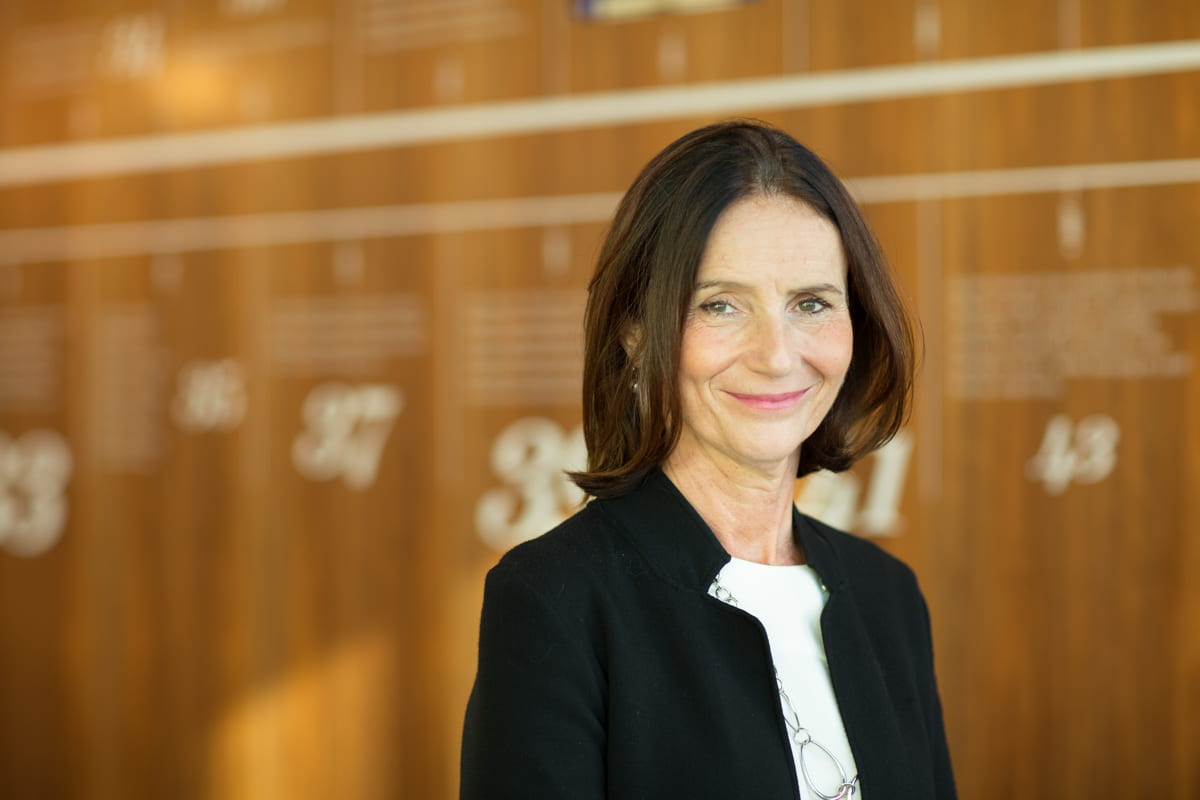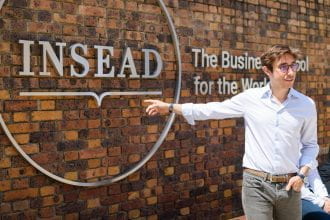The CBI’s new director general talks about her strategy for driving economic growth, vision for UK businesses and favourite memories from INSEAD

Carolyn Fairburn, the new director General of the CBI seen here at their offices in London, 2nd November 2015. Commissioned by Pip Brooking for Business Voice
The voice that speaks for UK businesses just became a lot stronger.
In November, Carolyn Fairbairn MBA ’88J was named director-general of the Confederation of British Industry (CBI), the UK’s premier business organisation that represents regional, national and international firms before policymakers. That role carries mighty responsibility, as Carolyn speaks on behalf of 190,000 businesses employing nearly 7 million people and oversees the decisions that will directly impact the future of the UK economy.
But if anyone’s equipped for the job, it’s Carolyn. Before joining the CBI, she held top positions at some of the world’s most prestigious organisations. At McKinsey & Company, she advised companies across the UK on issues of competitiveness and growth. She served as director of strategy and distribution at the BBC and was later appointed director of group development and strategy at ITV. She was also an economist at the World Bank, a journalist for the Economist, and a non-executive director at organisations including Lloyds Banking Group, The Vitec Group, Capita and the Financial Services Authority, among others.
While moving full-speed ahead in her new role, Carolyn took a few moments to speak with us about where she — and the UK economy — are headed next.
What attracted you to this role?
I believe that business has the answer to many of today’s challenges. It can fuel growth and prosperity, lead people to fulfilling careers, provide opportunities for all and deliver great public services, for example. CBI has a very important role to play within this. It serves as the voice of business across all sizes and sectors of the economy. It identifies common issues, concerns and ideas. It influences government. And it connects businesses with each other to share thoughts and inspiration.
You’ve identified mid-sized firms as instrumental to the growth of the economy. Why?
Firms of all sizes matter greatly to the UK economy. Our large firms are huge employers and contribute greatly to our economy in terms of living standards, making great public services possible and training the next generation of young people. Mid-sized firms are particularly powerful motors of growth. Between 2010 and 2014, 3,000 scale-up firms — that is, firms that have grown revenues 20-plus percent over three successive years — were the difference between recession and recovery in the UK. We need to support these firms with the right policy environment covering skills, infrastructure, tax, regulation and a climate of innovation.
What are some of the biggest challenges that UK businesses are facing today, and how does CBI support them?
The biggest challenges are connected to talent and skills, infrastructure, globally competitive tax and regulation, innovation and succeeding in world markets. All of these issues will drive productivity growth. The UK currently lags some of its peers in productivity growth, but now has every opportunity to catch up and overtake.
The CBI supports companies in three main ways. First, it identifies the ways in which the UK government can support thriving businesses and communicate these very clearly to government. Current examples include creating a stable energy policy environment and investing in world-class infrastructure. Second, it brings businesses vital and up-to-date information about the economy, global trends, political insight and business best practises. Third, it connects businesses to each other in valuable networks and conversations about the important issues of the day — by region, by sector and around key problems.
Congratulations on becoming the first female director at the CBI. Do you think that being a woman gives you a unique perspective at CBI?
I’m delighted to be the first female director. I have two daughters who couldn’t believe there hadn’t been one before me. I think being a woman enables me to talk openly about the challenges the UK faces in having more women in leadership roles.
Though the UK has been brilliant at raising the proportion of female non-executives on boards to 25 percent, the proportion of executive leaders is still very low, today, there are just nine more female executive directors on FTSE350 boards than in 2010. I believe that attracting more women into leadership roles will be vital to the UK’s future growth and competitiveness. We need to make the most of all available talent.
What is your broader vision for businesses in the UK?
Successful UK business holds the answer to many of the UK’s problems and the key to unlocking prosperity. UK businesses have particular strengths — high standards of integrity, a world-class city on its doorstep, talent for creativity and innovation, strong connections to great universities. These are all strengths that will count in the next wave of growth, what some are calling the fourth industrial revolution. UK companies have the capability to be world beating — and many already are — and are already capitalising on the opportunities.
Why did you choose INSEAD for your MBA?
I had already done a masters degree in the US and was very keen to stay in Europe to study for an MBA. INSEAD had a super reputation as a world-class business school, in the beautiful town of Fontainebleau, with a strongly international flavour attracting students from all over the world. Hard to resist!
What are some of your best memories of your time at INSEAD?
I loved my time at INSEAD. I remember wonderful balmy summer evenings eating freshly caught trout at the Ilse aux Truites restaurant; parties at Bois le Vent, a wonderful French villa rented by INSEAD friends; the summer ball in the Orangerie at Versailles. And I remember the lectures; my negotiation analysis class was great fun and has been invaluable in my career. But most of all, I remember the people. Many of my best friends today were people I met at INSEAD — including my husband!
Can you share that story?
Peter and I met in the first term at INSEAD and got married three years later. He is Canadian, and had come to INSEAD to explore setting up a hotel in France. After INSEAD, he and I went down the south of France and found a wonderful old provencal house that we bought and converted into a hotel called Crillon Le Brave. It began life as a New Ventures Project at INSEAD! We still have it — it is a thriving Relais et Chateau hotel with 40 rooms. We now live in Winchester with our three children.
What did you find most valuable about your education?
Having the chance to learn about business from great lecturers, with real practical case studies, alongside fellow students who each had a story or an example to tell. It prepared me brilliantly for what I then went to do.
In what ways has INSEAD shaped how you see the world?
INSEAD helped me to see the world from different perspectives. I had spent time in the US but not in France, and it combined a European set of values and culture with a hard-edged approach to global business. I worked in groups there with people from all over the world, and it has definitely shaped my sense of the importance and value of diversity and different cultures.


